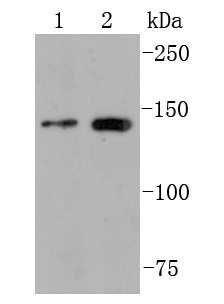-
Product Name
Anti-FGFR2 antibody
- Documents
-
Description
Rabbit monoclonal antibody to FGFR2
-
Tested applications
WB, IP
-
Species reactivity
Human, Mouse, Rat
-
Alternative names
BEK antibody; JWS antibody; BBDS antibody; CEK3 antibody; CFD1 antibody; ECT1 antibody; KGFR antibody; TK14 antibody; TK25 antibody; BFR-1 antibody; CD332 antibody; K-SAM antibody
-
Isotype
Rabbit IgG
-
Preparation
This antigen of this antibody was synthetic peptide within human fgfr2 aa 1-50.
-
Clonality
Monoclonal
-
Formulation
Liquid, 1*TBS (pH7.4), 0.05% BSA, 40% Glycerol. Preservative: 0.05% Sodium Azide.
-
Storage instructions
Store at +4℃ after thawing. Aliquot store at -20℃ or -80℃. Avoid repeated freeze / thaw cycles.
-
Applications
WB: 1:1,000-1:2,000
IP: 1:10-1:50
-
Validations

Fig1:; Western blot analysis of FGFR2 on different lysates. Proteins were transferred to a PVDF membrane and blocked with 5% BSA in PBS for 1 hour at room temperature. The primary antibody ( 1/500) was used in 5% BSA at room temperature for 2 hours. Goat Anti-Rabbit IgG - HRP Secondary Antibody (HA1001) at 1:200,000 dilution was used for 1 hour at room temperature.; Positive control:; Lane 1: MCF-7 cell lysate; Lane 2: Jurkat cell lysate
- Background
-
References
- Ramsey MR et al. FGFR2 signaling underlies p63 oncogenic function in squamous cell carcinoma. J Clin Invest 123:3525-38 (2013).
- Huang Y et al. Twist1- and twist2-haploinsufficiency results in reduced bone formation. PLoS One 9:e99331 (2014).
Related Products / Services
Please note: All products are "FOR RESEARCH USE ONLY AND ARE NOT INTENDED FOR DIAGNOSTIC OR THERAPEUTIC USE"
